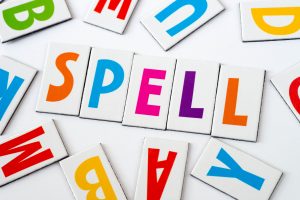Related Products
For Professionals
- Amplification
- Assessment of Student Skills, Challenges, Needs
- Early Childhood: Infants, Toddlers, Preschool
- Hearing Loss – Identification, Impact and Next Steps
- IDEA Law Summary Information
- Language and Speech Development Issues
- Legal Issues in Serving Children with Hearing Loss
- Listening (Auditory Skills) Development
- Planning to Meet Student Needs
- Self-Advocacy Skills for Students with Hearing Loss
- Self-Concept: How the Child with Hearing Loss Sees Himself
- Social Skills
- Speech Perception & Learning
Related Teacher Tools Takeout Items
Targeting Spelling Challenges for Students with Hearing Loss
 Spelling accurately is often difficult! This article provides strategies for improving the spelling skills of our students with hearing loss. Research suggests that the spelling of children with hearing loss is different, because of their lack of hearing, which requires them to rely on other strategies. The ability to hear and to use sign language, together and respectively, play a significant role for the spelling patterns and spelling strategies used by the children with and without hearing loss.
Spelling accurately is often difficult! This article provides strategies for improving the spelling skills of our students with hearing loss. Research suggests that the spelling of children with hearing loss is different, because of their lack of hearing, which requires them to rely on other strategies. The ability to hear and to use sign language, together and respectively, play a significant role for the spelling patterns and spelling strategies used by the children with and without hearing loss.
Many of you may remember how spelling was taught in elementary school: a list of spelling words was assigned on Monday, practiced throughout the week, homework was to write the spelling words three times each, practice test on Thursday, and the big test on Friday. In some grades, the ‘big’ test on Friday could be skipped if a grade of 100 was obtained on Thursday. This was the routine for decades.
Many school systems have de-emphasized or abandoned teaching spelling hoping that students will ‘get it’ implicitly through reading instruction, daily phonics lessons, and exposure to print. We know our students won’t just ‘get it’ as part of the impact of having a hearing loss. High-frequency sounds may be missed, vowels may be difficult to distinguish, and some students may not hear the speech sounds at all. Additionally, using implicit instruction, progress in spelling skill development is much more difficult to track.
| “In a computer analysis of over 17,000 English words, it was found that “approximately half could be spelled using simple sound-letter combinations (i.e. phonics), over one-third were regular except for one sound, and most of the remainder could be derived using etymological information (e.g., having a prefix of Greek origin).” |
Not only that, Pan, Rickard & Bjork (2021) state that “…the 26 letters of the English alphabet can be used to represent 44 different sounds and create over several hundred letter combinations.” and “…learners typically need to master 6000-12,000 words to write effectively in English.” The proponents of the spelling test expulsion argue that the English language is so complex and full of irregularities that spelling instruction doesn’t help. However, research suggests that English words do have more predictable spellings than not.”
How can we support our students who are deaf or hard of hearing when learning to spell?
| By assessing the student’s knowledge of word features, instruction can be targeted, and progress can be monitored. |
First, assess. Some literacy programs may have a spelling inventory included in their materials. If not, Words Their Way (Bear, Invernizzi, Templeton, and Johnston) has helpful primary, elementary, and upper level spelling inventories that can be used to determine a baseline for instruction.
Teach with a plan.
- Use word families, word patterns, and word sorts in the areas the student is having difficulty.
- Teach not only the spelling of the word, but the meaning of the word. When you spontaneously use the word in a sentence, or find it in literature, point it out.
- Try a more morphological approach to spelling as opposed to a phonics-based approach. Teach words with Latin and Greek roots and affixes. This not only helps when spelling, but also helps determine the meaning. A list of commonly used roots and affixes can be found here.
- Encourage using a list of commonly misspelled words when writing.
- 100 Most Frequently Misspelled Words Across Eight Grade Levels
- 102 Frequently Misspelled Words
- Make personal dictionaries with students. Include basic words with pictures and write/draw pictures of words as the student encounters them.
Repetition, repetition, repetition.
For students with little to no access to sound, Visual Phonics or Cued Speech are powerful tools that can be used to help with spelling.
- Research on use of Visual Phonics with students who are deaf/hard of hearing Article, Article
- Research on the use of Cued Speech to support literacy of deaf/hard of hearing students Article
Even in the age of auto-correct, spellcheck, and word predicting software, being able to spell well continues to be a marker of a good reader and communicator.
Source: https://link.springer.com/article/10.1007/s10648-021-09611-y#Abs1

Teacher Tools Takeout resources:
- https://teachertoolstakeout.com/1007-phonological-awareness
- https://teachertoolstakeout.com/search?insubgrp=all&q=morphology
- https://teachertoolstakeout.com/0949-comprehension
SSCHL Products to support literacy:
- https://successforkidswithhearingloss.com/product/academic-vocabulary-for-middle-schoolers/
- https://successforkidswithhearingloss.com/product/bedrock-literacy-curriculum/
- https://successforkidswithhearingloss.com/product/latin-and-greek-roots-teaching-vocabulary-using-hands-on-activities-and-common-objects/
- https://successforkidswithhearingloss.com/product/vocabulary-handbook/
Supporting Success Courses to support literacy:
- https://www.supportingsuccesscourses.com/courses/literacy-support
- https://www.supportingsuccesscourses.com/courses/developing-written-language
Author: Brenda Wellen
Click here to download this article
